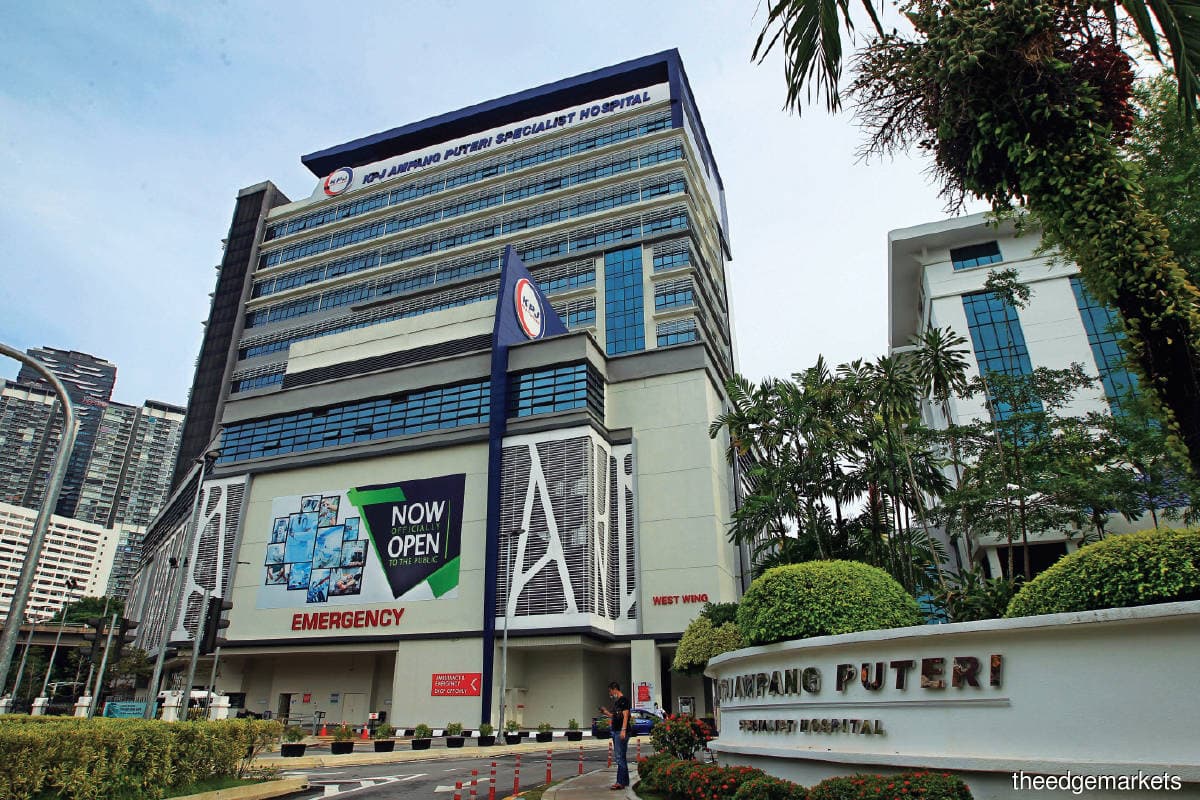
This article first appeared in The Edge Malaysia Weekly on October 4, 2021 - October 10, 2021
JOHOR Corp (JCorp) and private equity fund TPG are likely to submit to the KPJ Healthcare Bhd board a proposal to take the healthcare group private in an exercise that values it at up to RM5.4 billion.
JCorp and TPG are likely to set up a special purpose vehicle (SPV) that would make an offer to mop up the KPJ shares at between RM1.20 to RM1.25 each. JCorp holds almost 46% in KPJ while the next largest shareholder is the Employees Provident Fund (EPF) at 13%, followed by Kumpulan Wang Persaraan (Diperbadankan) with 5.4%.
The healthcare group, which mainly operates in Malaysia, closed last Friday at RM1.21 per share. The normally inactive counter has seen its share price rise in the last three days from the RM1.06 sen level.
According to sources, the offer price was arrived at after taking into account the share price of KPJ of about 90 sen earlier this year before it started to move up on news of a possible privatisation.
“Both JCorp and TPG are expected to jointly write to the board on their proposal to take the company private within the next two weeks,” says a source.
When contacted, JCorp declined to comment on the possible privatisation.
“As a major investment holdings institution with core businesses involved in the Malaysian economy, we are continuously reviewing and assessing our investments. This is with a view to strengthen our investment portfolio.
“Given that JCorp invests in listed entities on Bursa Malaysia, we are committed to exacting disclosure requirements. Should there be any pertinent announcements to be made, we will do so in accordance with these requirements,” JCorp states in a reply to The Edge.
KPJ, which operates 28 hospitals in Malaysia and has a small presence in Indonesia and Bangladesh, has 3,410 beds. Its bed occupancy dropped to 48% in the financial year ended Dec 31, 2020, due to the Covid-19 pandemic. Pre-pandemic, the bed occupancy levels generally averaged 65%.
Compared with its peers such as IHH Healthcare Bhd, KPJ’s market capitalisation is smaller owing to its lower profitability and limited regional presence. Its strength lies in its reach in Malaysia where it has the biggest hospital chain and treats more than 2.5 million outpatients a year. Last year, its inpatients amounted to 246,000.
Generally, the valuations of healthcare groups have gone up due to the pandemic because of a greater need for private healthcare services.
In June this year, Sunway Healthcare Sdn Bhd, which has two full-fledged hospitals, saw the entry of Singapore GIC Pte Ltd, in a transaction valuing the group at RM4.69 billion. GIC took a 16% stake for RM750 million and is expected to increase its stake as the Sunway group expands its healthcare business.
IHH Healthcare group is one of the most expensive hospital groups in the region, trading at a forward price-earnings (PE) multiple of 43 times.
It is probably one of the most sought after healthcare groups in Asia because of its presence in nine countries, including Hong Kong, Singapore, Malaysia, Turkey and India.
KPJ is trading at an even higher valuation of 63 times forward PE multiple, but this is largely due to the speculation of a corporate exercise, which has caused its share price to move up.
“KPJ’s valuation only moved up in the last few days. Its fundamentals cannot be compared to IHH’s. Also, KPJ’s earnings for the financial year ended 2020 came off due to the pandemic, but its cash flow is fairly strong,” says an analyst.
The analyst also says that the valuation of Sunway Healthcare, which has only two full-fledged hospitals, gives a new perspective to KPJ’s value.
“KPJ has a wider chain of hospitals and is easily the most popular with those seeking private healthcare treatment but are unable to afford the lofty fees. Which is why KPJ has so many outpatients coming in compared to other private hospitals,” he points out.
KPJ, which has net debt of RM1.6 billion and commands a market capitalisation of RM5.2 billion, is expected to have an earnings before interest, tax, depreciation and amortisation (Ebitda) of about RM540 million on an annualised basis. Pre-pandemic, the group used to record an Ebitda of more than RM630 million.
TPG is no stranger to the healthcare industry in Malaysia. In September 2019, it acquired the Columbia Asia Hospital chain together with the Hong Leong group for US$1.2 billion. Columbia Asia has 12 hospitals in Malaysia, three in Indonesia and two in Vietnam. The Columbia Asia group has 11 hospitals in India but it was not part of the deal.
A tie-up with KPJ would cement TPG’s position as the leading private healthcare provider in Malaysia.
It is believed that other private equity funds were also looking at KPJ for its network in Malaysia.
The hospital group registered one of its better results in 2019, with a profit of RM226 million on a turnover of RM2.7 billion. Last year, its profit fell to RM110.4 million on a lower turnover of RM2.4 billion. However, its Ebitda margin, a measure of improving cash flow from operations, has been growing in the last five years, creeping up from 18% in 2016 to 22.5% last year.
Save by subscribing to us for your print and/or digital copy.
P/S: The Edge is also available on Apple's AppStore and Androids' Google Play.
